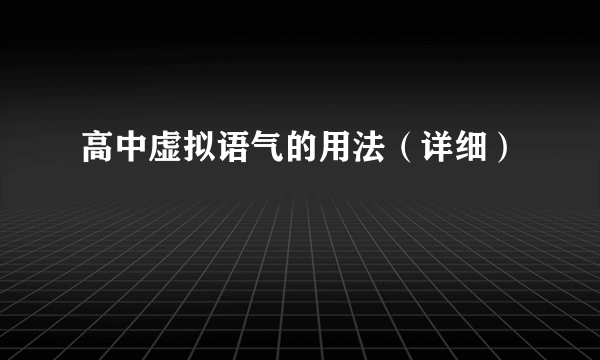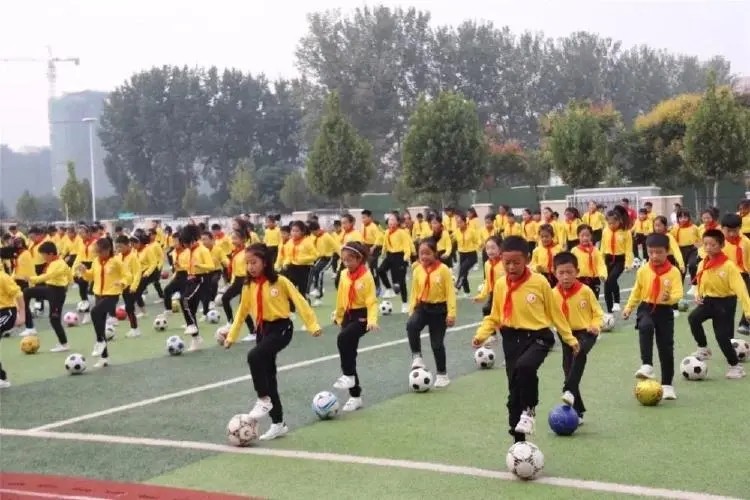高中虚拟语气的用法(详细)
的有关信息介绍如下:
虚拟语气 第一部分:语气的定义和种类 1 语气(mood) 语气是动词的一种形式,表示说话人对某一行为或事情的看法和态度。 2 语气的种类 ⑴、陈述语气:表示动作或状态是现实的、确定的或符合事实的,用于陈述句、疑问句和某些感叹句。如: ①There are two sides to every question.每个问题都有两个方面。 ②Were you busy all day yesterday?昨天一整天你都很忙吗? ③How good a teacher she is!她是多好的一位老师啊! ⑵、祈使语气:表示说话人对对方的请求或命令。如: ①Never be late again!再也不要迟到了。 ②Don’t forget to turn off the light.别忘了关灯。 ⑶、虚拟语气:表示动作或状态不是客观存在的事实,而是说话人的主观愿望、假设或推测等。如: ①If I were a bird, I could fly in the air.如果我是一只小鸟,我就能在空中飞行。 ②I wish I could pass the examination.我希望我能通过考试。 ③May you succeed!祝您成功! 虚拟语气在语法里算得上是个难点。让我们就从最简单的开始吧。 第二部分:简单句中的虚拟语气 一、情态动词的过去式用于现在时态时,表示说话人的谦虚、客气、有礼貌、或委婉的语气,常用于日常会话中。如: ⑴.Would you be kind enough to show me the way to the post office?请你告诉我去邮局的路好吗? ⑵.It would be better for you not to stay up too late.你最好别熬夜到很晚。 二、表祝愿。 1、常用“may+动词原形”表示祝愿,但愿,此时may须置于句首(多用于正式文体中)。 ⑴、May good luck be yours!祝你好运! ⑵、May you be happy!祝你快乐! ⑶、May you do even better!祝你取得更大成就! ⑷、May you have a good time. 祝愿你玩的痛快。 ⑸、May the friendship between us last long. 祝愿我们的友情天长地久。 ⑹、May you be happy. (注意那个be ) 祝你幸福。 2、用动词原形。例如: (1).Long live the people! 人民万岁! (2).“God bless you,”said the priest.牧师说:“愿上帝保佑你!” (3).Have a good journey! 祝愿你旅途愉快! 三、表示强烈愿望。(该类型虚拟语气谓语仅用动词原形,第三人称单数也不加“s”) (1).God save me. (2).Heaven help us. 四、表命令 1.命令虚拟语气只能用在第二人称(you),而且通常省略主语(也就是you)。 2.句子尾通常加上感叹号:! 3.虚拟语气动词用一般现在时态(Simple Present),如:work, be , go 4.否定形式的命令语气,可用助动词do,加上not。 (1). Work ! (2). Work harder ! (3). Be more alert ! (虚拟语气动词Be) (4). You go out ! (5). Do not work so hard. (do not 表示否定的虚拟语气) (6). Don't be afraid. (口语中常用don't 代替do not) 五、在一些习惯表达中。如: (1).You’d better set off now.你最好现在就出发。 (2).I’d rather not tell you the secret.我情愿不告诉你这个秘密。虚拟语气(Subjunctive Mood)这一语法项目是各类英语考试中心测试的重点之一。虚拟语气是一种特殊的动词形式,用来表示说话人所说的话并不是事实,而是一种假设、愿望、怀疑或推测。Ⅰ用以表示虚拟条件的虚拟语气⒈ 用if条件从句表示的虚拟条件,是虚拟条件最普通的方式。① 虚拟现在时表示与现在事实相反的假设,其if 从句的谓语形式用动词的过去式(be 一般用were),主句用would/ should/ could/ might +动词原形,例如:If I were in your position I would marry her.② 虚拟过去时是表示与过去事实相反的假设,if 从句的谓语形式用过去完成时即had+过去分词,主句用would / should / could / might + have +过去分词,例如:If it had not rained so hard yesterday we could have played tennis.③ 大多数的虚拟条件句属于上面三种情况的一种,但并不排除存在条件和后果中,一个和现在情况相反,另一个和过去情况相反,例如:If you had followed what the doctor said, you would not have been so painful now.这个句子在高中出现频率颇高。④ 但是,如果后果用了虚拟语气,而条件却用陈述语气,这种用法是错的。⒉ 除了表示虚假条件外,if从句还可以表示对将来的推测,由于是将来还没有发生的,所以谈不上是真实的还是虚假的,只能说这个事情发生的可能性有多大。一般情况下,可以用陈述语气的if从句来表示对一个未来事实的推测,这个事实是完全可能发生的。If从句的谓语形式用一般过去式或用were to / should +动词原形,主句用would / should /could/ might +动词原形,例如:Jean doesn't want to work right away because she thinks that if she were to get a job she probably wouldn't be able to see her friends very often.(1996年1月四级第44题)⒊ 有时可以把含有助动词、情态动词、be或have的虚拟条件句中的连词if 省去,而将had , should, were 等词提到主语之前,即用倒装结构,这时候,如果出现not等否定词,否定词需放在主语后面。这种结构在口语中很少使用,但频频出现在各类考试中出现,例如:If it had not rained so hard yesterday we could have played tennis.→Had it not rained so hard yesterday, we could have played tennis.⒋ 大多数的虚拟条件通过上面所讲的两种方法表达,但在个别句子中也可以通过介词without和介词短语but for表达,副词otherwise等表达出来。例如:We didn't know his telephone number; otherwise we would have telephoned him.(1995年6月四级第46题)值得注意的是,包含but for的句子,谓语动词必定要用虚拟形式,但包含without等短语的句子,谓语动词未必一定要用虚拟语气。⒌ 有时虚拟条件不是明确地表达出来,而在蕴含在用but引导的从句里,于是便出现了有谓语动词是虚拟语气的主句加上谓语动词是陈述语气的but从句构成的并列复合句,例如I would have hung you but the telephone was out of order.在这样的句子里,如果主句没有用虚拟语气,或者从句用了虚拟语气,都是错的。Ⅱ用在宾语从句中的虚拟语气⒈ 在表示愿望的动词wish后的宾语从句中,需用虚拟语气。(wish后的that 常省略),根据主句时态,从句谓语时态相应退后一位,例如:How she wished his family could go with him.⒉ 在具有愿望、请求、建议、命令等主观意愿的动词(desire, demand, advice, insist, require, suggest, propose, order, recommend, decide …) 后的宾语从句中需用虚拟语气。谓语动词用(should) +动词原形。值得注意的是,如果宾语从句的动词是否定的,否定词not的位置应在动词之前,而不是动词之后。例如:The head nurse insisted that the patient not be move.另外,如suggest表达“暗示”,insist表示“坚持某种说法”时,后面的从句不用虚拟语气,例如:Her pale face suggests that she is ill.或He insisted that he did not kill the boy.除此之外,上述动词也要求用虚拟式① 在It is+上述动词的过去分词,其后所跟的主语从句中,如It is suggested that pupils wear school uniforms.② 在上述动词相应的名词形式作主语+连系动词,其后的表语从句中,例如His suggestion was that classed be re-scheduled.③ 在对上述动词相应的名词进行解释的同位语从句中,如:The workers raised the demand that their pay be increased to cope with the inflation.⒊ would (had)rather , would sooner也用来表达主观愿望,它们之后的宾语从句中需用虚拟语气。谓语动词用过去式表示现在或将来,用过去完成式表示与过去事实相反,例如:I would rather he went right now.Ⅲ其他形式的虚拟语气⒈ it is +necessary等形容词后,that主语从句中虚拟形式使用,这类形容词包括necessary, important, essential, imperative, urgent, preferable, vital, advisable等,例如It is necessary that you listen to the teacher carefully.或者It is essential that you be able to pronounce every single word correctly.⒉ 在It's (high/about) time 之后的定语从句中需用虚拟语气。谓语动词用过去式,例如It is high time that you went to school⒊ 虚拟语气在as if / as though 引导的方式状语从句中的应用(谓语动词形式与wish后的宾语从句基本相同)表示与现在事实相反或对现在情况有怀疑,谓语动词用过去式。例如:He felt as if he alone were responsible for what had happened. 表示过去想象中的动作或情况,谓语动词用过去完成式。 ⒋ 在lest 引导的状语从句中,谓语动词多用虚拟语气,(should )+ 动词原形。例如: The mad man was put in the soft-padded cell lest he injure himself.(1998年1月四级第38题)⒌ 在if only 引起的感叹句中需用虚拟语气。谓语动词用过去式或过去完成式。例如: Look at the terrible situation I am in! if only I had followed your advice.



